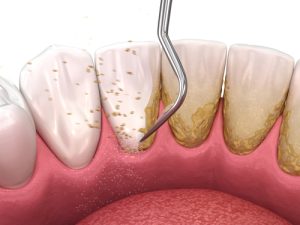Remove Plaque and Tartar to Keep Your Smile Healthy in Dumas, TX

At Dumas Family Dental, our experienced dentists in Dumas, TX, help patients achieve and maintain clean, healthy teeth with effective plaque and tartar removal treatments. If you live in Dalhart, Sunray, Stratford, or Cactus, TX, understanding how to manage plaque buildup can help you avoid serious dental problems down the road. Contact us today by calling (806) 583-0872 to learn more about the importance of plaque and tartar removal.
What Is Plaque?
Plaque is a sticky, colorless film of bacteria that constantly forms on your teeth. It develops when leftover food particles mix with bacteria in your mouth. If plaque isn’t removed regularly through brushing and flossing, it can harden into tartar and cause dental issues like cavities and gum disease.
How Does Plaque Form?
Plaque begins to form just hours after you brush your teeth. The bacteria in plaque feed on sugars and starches from the food you eat, producing acids that weaken your tooth enamel. Over time, plaque buildup can irritate your gums, leading to inflammation and early stages of gum disease.
What Is Tartar?
Tartar, also known as calculus, is hardened plaque that has been left on the teeth for too long. Unlike plaque, which can be brushed away, tartar is firmly attached to the teeth and can only be removed by a dentist.
How Does Tartar Affect Your Oral Health?
Tartar buildup is dangerous because it provides an ideal surface for bacteria to thrive. It can cause:
- Tooth Decay: The acids in plaque and tartar eat away at enamel, leading to cavities.
- Gum Disease: Tartar irritates the gums, causing redness, swelling, and bleeding. If untreated, this can lead to more serious gum infections.
- Bad Breath: Bacteria in tartar release foul-smelling gases that cause chronic bad breath.
- Tooth Loss: Advanced tartar buildup can destroy the structures that support your teeth, leading to tooth loss.
Signs You Need Plaque and Tartar Removal
Since plaque is nearly invisible, you may not always notice when it’s accumulating. However, some common signs indicate that it’s time to take action:
- A sticky or fuzzy feeling on your teeth
- Yellow or brown deposits on your teeth (especially near the gumline)
- Swollen, red, or bleeding gums
- Persistent bad breath
- Increased tooth sensitivity
If you experience any of these symptoms, visiting Dumas Family Dental can help you prevent further damage.
Best Ways to Remove Plaque and Tartar at Home
Brushing and Flossing Properly
The first line of defense against plaque buildup is maintaining a strong at-home oral hygiene routine.
- Brush Twice a Day: Use a fluoride toothpaste and brush for at least two minutes to remove plaque effectively. Pay close attention to the gumline and hard-to-reach areas.
- Use a Soft-Bristled Brush: This helps prevent gum irritation and enamel erosion.
- Floss Daily: Flossing removes plaque from between the teeth, where a toothbrush can’t reach.
Using an Antiseptic Mouthwash
A mouthwash with antibacterial ingredients like chlorhexidine or essential oils can help kill bacteria and slow plaque formation. Rinse daily after brushing and flossing for added protection.
Professional Dental Cleanings
Even with the best at-home care, some plaque and tartar will still accumulate over time. That’s why professional cleanings at Dumas Family Dental are essential.
- Scaling & Root Planing: For patients with significant tartar buildup, dentists may recommend deep cleaning procedures to remove tartar from above and below the gumline.
- Regular Cleanings: Dentists use special tools to remove tartar safely and thoroughly. Visiting a dentist every six months ensures that your teeth stay plaque-free.
Maintaining a Healthy Diet
The food you eat plays a huge role in plaque formation. To minimize buildup:
- Avoid Sugary and Starchy Foods: Bacteria in plaque thrive on sugar and starch, leading to increased plaque production.
- Eat Crunchy Fruits and Vegetables: Foods like apples, carrots, and celery naturally clean your teeth while you chew.
- Drink Plenty of Water: Water helps rinse away food particles and bacteria, preventing plaque from settling on your teeth.
Using Tartar Control Products
If you’re prone to tartar buildup, consider using toothpaste and mouthwash specifically designed to prevent tartar formation. Look for products with fluoride and pyrophosphates, which help keep plaque from hardening into tartar.
What Happens If Plaque and Tartar Are Left Untreated?

- Gingivitis: The first stage of gum disease, causing swollen and bleeding gums.
- Periodontitis: A more severe form of gum disease that can damage the bone supporting your teeth.
- Tooth Loss: If gum disease progresses, it can lead to tooth loss and the need for dental implants or dentures.
If you live in Dumas, TX, or nearby areas like Hartley, Moore, or Etter, TX, and are experiencing gum irritation or other oral health concerns, schedule a visit to Dumas Family Dental by calling (806) 583-0872 for a professional cleaning and exam with one of our dental hygienists.
Preventing Plaque and Tartar Buildup for the Long-Term
The best way to prevent plaque and tartar problems is to stay consistent with your oral hygiene routine. Here are some long-term strategies to keep your teeth clean and healthy:
- Stick to a Daily Routine: Brush, floss, and use mouthwash every day.
- Schedule Regular Checkups: Professional cleanings every six months prevent serious dental issues.
- Stay Hydrated: Drinking water throughout the day helps wash away plaque-causing bacteria.
- Limit Snacking: Eating between meals increases the risk of plaque formation, especially if you’re consuming sugary foods.
Frequently Asked Questions
No, plaque removal is typically painless. However, some people may experience mild discomfort or sensitivity during the procedure. This is because the dental professional is scraping away plaque and tartar from your teeth, which can cause some sensitivity or discomfort. Should you experience severe pain during the dental cleaning procedure, let your dentist know immediately.
While brushing and flossing can help prevent plaque and tartar buildup, it’s not possible to remove tartar at home. Tartar is a hardened form of plaque that can only be removed by a dental professional using specialized tools. However, you can prevent tartar buildup by brushing twice a day, flossing daily, and following a healthy diet.
Yes, there’s evidence to suggest that poor oral health, including plaque and tartar buildup, can contribute to other health problems such as cardiovascular disease and diabetes. The bacteria in dental plaque can enter the bloodstream and cause inflammation, which can lead to these and other health problems. That’s why it’s essential to maintain good oral hygiene and have regular dental checkups.
You may experience some sensitivity or soreness in your gums for a day or two following the procedure. It’s also common to experience some bleeding when brushing or flossing. However, if the bleeding persists or you experience any severe pain or swelling, you should contact your dentist.
Keep Your Smile Bright and Healthy at Dumas Family Dental
Plaque and tartar removal are essential for maintaining a beautiful, healthy smile. While daily brushing and flossing help control plaque, regular professional cleanings at Dumas Family Dental ensure that stubborn tartar is effectively removed.
If you’re in Dumas, Cactus, Dalhart, Stratford or the surrounding areas, and need a professional cleaning, contact our Dumas, TX dentist today by calling (806) 583-0872. Our skilled dental team is here to help you achieve optimal oral health and keep your smile looking its best for years to come.
